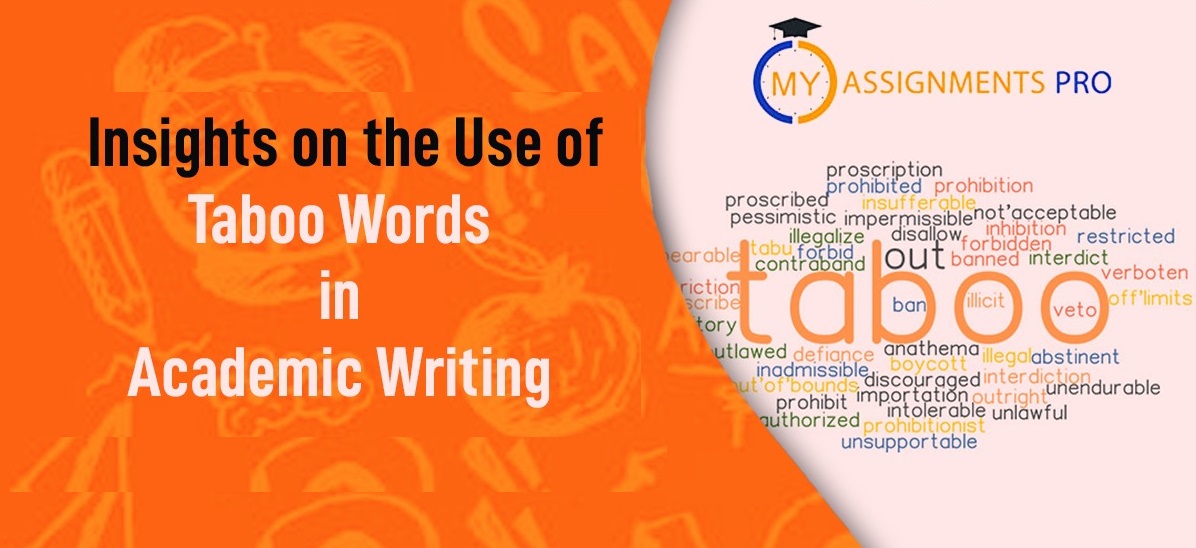
Many terms and phrases that are acceptable in conversation or informal writing are considered inappropriate in academic writing when you are writing a dissertation, thesis, or research paper. If you're going to use a word or phrase, you should avoid using it in a too casual, unprofessional, vague, exaggerated, or subjective way. If you face issues regarding the prohibited phrases then it’s advisable to choose my assignment services in Australia.
Types of Prohibited Phrases and Examples of Each:
You'll find a list of taboo words broken down into various categories in the following sections.
- Inadequately Formal
Academic writing is commonly more formal than the writing we encounter in non-academic sources (including in web pages or blogs). We use a more formal tone in academic writing than in our everyday conversation. A dissertation or any other academic paper may not contain words like a little, a lot, contradictions like cannot or will not. Several or multiple can be used in place of the word "a lot" when composing a sentence. Isn't too is, not or can’t too cannot, can be changed as well.
In some contexts, certain words and phrases are acceptable, but when used at the start of a sentence, they become too informal. Transition words can be used to replace or altogether remove such words at the beginning of a sentence. Additionally, you can also consider replacing so with, therefore, in the case of informal taboo word examples.
- Not specific enough
You don't want people to interpret your academic paper in various ways by using too many vague terms. Always be as clear as possible in your writing. For example, instead of saying "stuff," you could say something like "evidence/details" instead.
- Insufficiently Sophisticated
To avoid making your writing seem less severe, you should avoid using too many random and simple terms in your work. Switching phrasal verbs for their one-word equivalents is also a good idea. If you're writing an academic paper, remember that more complex words aren't necessarily better than simpler ones.
- Too Exaggerated
Academic writing is usually straightforward and uncomplicated. Dramatic adjectives (like always and never), superlatives (like best or greatest), and emphasis words (like very) are often used in the context of adverbs of frequency. These claims may have some truth to them because they are making a significant claim when they say something is flawless or never happens. It's best to use these words sparingly, but they can be helpful at times.
- Too Subjective
Certain words and phrases serve to draw attention to your own predispositions. As an example, if you say that something is "obviously" going to happen, you're not stating a fact; you're just saying that you think it's obvious.
It is acceptable to elaborate on your personal beliefs in some sections of a thesis and in particular academic texts (like personal statements and argumentative or reflective essays). The use of subjective language must be guarded against in many instances. Make your point with a less biased approach, or let the facts do the talking.
- Most of the Time Not Necessary
Aim to keep your academic papers to a minimum in length. Do not include meaningless words and phrases in your writing, even if you believe they give it a more polished appearance. For example, write "the research paper has got six chapters," not "the research paper has six chapters," for example.
- A lot of the time, incorrect
Even native language speakers make grammatical and lexical errors when using specific words and phrases. If you continue to make similar mistakes, you may come to feel that they are correct after a while. You must, however, be cautious not to utilize them more than once in a single document or in many papers.
It's essential to remember that some of these blunders can be traced back to common misunderstandings. For example, we frequently mistakenly interpret the speaker's words as meaning "would " rather than "would have."
Other Suggestions for the Proper Use of Off-B limits Phrases
In addition, the following terms and phrases should be avoided:
- Think outside the box, or at the end of the day, are two examples of clichés.
- Jargon: Termologies that are unfamiliar to the general public.
- Commonly used abbreviations: "fridge," "photo," "TV," etc.
- To use sexist language: firefighters, athletes, etc.
The Last Lines:
The way you use language is the same regardless of whether you're working on an essay or a dissertation. Academic writing necessitates a formal tone and style of writing, as you probably already know. However, many of you may be unaware of the proper way to utilize the right to make your papers appear more formal. MyAssignments Pro's assistance is always beneficial in this situation.
There are taboo words, and our writers know how to replace them. They've been writing academic papers for years, so you know they'll deliver high-quality work. Our team of editors and proof readers will maintain the tone and style of your formal academic papers. Using My Assignments services in Australia, you can rest assured that your papers will be error-free and of the highest quality.



